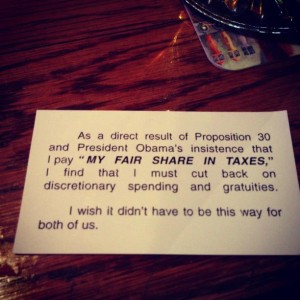In nearly every radio interview I have ever done someone will call in to ask, “Why do I have to tip?â€Â They feel it would be easier to simply add the price of service into the cost of the meal. It is an interesting question and one that I love to answer. Hidden in the question is the presumption that tipping is compensating a server for service alone. When you look at the economics of restaurants, tipping saves guests far more money than it costs them. In a world where servers did not get tips, you would pay more and receive inferior service.
As a society, we have determined that the way we compensate restaurant servers is through tipping. This is so accepted that the law allows restaurants to pay servers far less than the minimum wage. The federal minimum wage for restaurant servers is $2.13 an hour. Some states have laws that make this rate slightly higher, but in 44 states the wage is still below minimum wage.
As a result of this low wage, restaurants charge you less for your meal. In a typical restaurant budget, the wages of servers (and the busboys, food runners, and bartenders that servers share your tip with) accounts for 10% of the price of your meal. In order to pay servers even the minimum wage it would require a 350% increase in the amount they are paid by the restaurant. This means that a $10 meal that previously included $1 in wages would have to sell for $12.50. This price increase would cost you more than even a generous tip.
Now this also takes into account that someone would be willing to wait tables for minimum wage. Even fast food restaurants pay well above minimum wage. Given to choice of the two jobs for the same pay, you would find me standing at a drive up window asking you to pull around. Anyone who frequents fast food restaurants can attest to the realization that the order has been messed up or that items are missing. While servers make mistakes too, they don’t ask you to drive back to them to correct the error. To pay a wage necessary to get someone to serve that $10 burger, clean up afterwards, and give you the level of service you are accustomed to, it will cost far more than minimum wage. If you think restaurants are expensive now, remember that they cost less because the server is working for a tip.
The real shift that would occur in restaurants without tips is the level of service you would receive. It is relatively easy to tell when you walk into a retail store if the staff is paid on commission. If there is no financial incentive involved in providing excellent customer service, you will often receive service barely adequate to avoid a compliant. If servers were paid a higher hourly wage, restaurant would respond by pressuring them to sell more. As a result the focus would be on sales and not service. If you think servers can be pushy now, imagine if their primary objective was to have you spend more instead of tip more.
So the result of a tipped based system is a server who has every incentive to give you better service in order to receive a better tip. You also benefit from food that is less expensive even with a tip than it would be if the server was paid a flat hourly wage. In essence the server is taking a lower wage in order for you to pay less for the food. The way you repay them is through tipping. It is not a perfect system, but it certainly less expensive and encourages better service than the alternatives.



